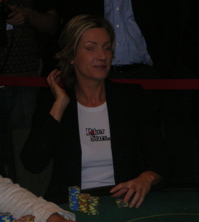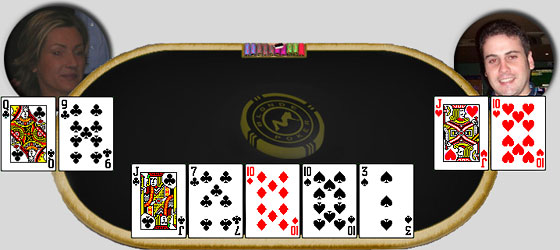 Although the opening two editions were just trial runs, the blonde poker Hand of the Week has been such a success that we have happily thrown ourselves into the hat-trick, this week analysing the play of German pro and PokerStars sponsored player, Katja Thater.
Although the opening two editions were just trial runs, the blonde poker Hand of the Week has been such a success that we have happily thrown ourselves into the hat-trick, this week analysing the play of German pro and PokerStars sponsored player, Katja Thater.As always, resident blondeite, Chris ‘NoflopsHomer’ Hall, has been asking the forum all week for their views and opinions on the following hand…
Day 1 of the Irish EPT in Dublin, blinds 150/300 with a running ante of 25. The table is 9-handed and Brummie pro and all round piss-head, Stuart ‘Foxy’ Fox, has raised it up to 900 from the cut-off with a 14,500 stack in front of him. Thater, 15,500, calls from the small blind with Qc-9c and both see a potentially action-packed Jc-7c-Td Flop.
Being the quizmaster that he is, Magnus Flopperson swiftly fired out the questions? (a) Should she have called (b) What should she do now? (c) Is it worth check-calling?
These posers prised out the usual concise and valid responses from the likes of TightEnd, totalise and Royal Flush, but we were also blessed with the presence and evaluation skills of renowned and highly respected poker pro Harry Demetriou, who paid the hand more than a fleeting glance to deliver the following pearls of wisdom:
"1. If you think Stuart Fox has been raising a lot of the tims from the cut-off or late position, I would favour re-raising pre-flop from the small blind rather than just calling as it is extremely difficult to play from out of position with a mediocre hand like Q-9 suited. However, if you do this and get a re-raise from the Big Blind or Staurt, you must be prepared to then fold.
 It is extremely difficult to play from the small blind and to be honest my favoured play pre-flop would be to fold here as I still have to worry about the Big Blind finding a hand. Although you are getting immediate pot odds of 2/1 to call pre-flop and implied odds of around 14/1, these implied odds only count if you flop a monster and get a call from Stuart once a board appears. However, there is also such a thing as reversed implied odds where Staurt may be holding something like A-Q or A-9 and a Q or 9 flops. When this happens you are likely to lose all or at best a very large chunk of your stack so those implied odds of 14/1 suddenly shrink to a much smaller amount.
It is extremely difficult to play from the small blind and to be honest my favoured play pre-flop would be to fold here as I still have to worry about the Big Blind finding a hand. Although you are getting immediate pot odds of 2/1 to call pre-flop and implied odds of around 14/1, these implied odds only count if you flop a monster and get a call from Stuart once a board appears. However, there is also such a thing as reversed implied odds where Staurt may be holding something like A-Q or A-9 and a Q or 9 flops. When this happens you are likely to lose all or at best a very large chunk of your stack so those implied odds of 14/1 suddenly shrink to a much smaller amount.To simplify things, I prefer to think of a hand like Qc-9c from the small blind (out of position), with the threat of the Big Blind having a hand and Stuart having a possible better hand, as a junk hand that will most likely make second best and as such should be folded. If the stack sizes were double what they are then I would certainly be ‘thinking’ about calling but it would still be no bargain.
In No Limit, position is everything and playing hands that are likely to make second best hands should not be played and this is why you should always try and avoid playing things like K-J, A-J, A-T etc etc and remembe,r this is just a Q-9 with the suited bit just confusing the issue as in short handed pots suitedness counts for very little (has greater value when you get in cheaply and there are several opponents which definitely doesn't apply here).
If Stuart is at it and stealing blinds and antes then let him have it as you will invariably find a better spot to get your money in at a later stage.
2. I have little doubt that the best way to proceed once the flop has come is to lead out. You are most likely a favourite at this point with little to fear and I’d favour a bet of around 2/3 the pot or 1,600. If Stuart hasn't got a hand you pick the pot up there and then as you have fold equity. If he has top pair or an overpair and re-raises you then you would be happy to ship all your chips in with this board as you have many outs. Staurt can hold very few hands here that frighten you but you have to be prepared to get all your chips in when you have flopped so well.
 The idea behind leading out is two fold. Firstly, as stated above, you can win the pot there and then without improving and, secondly, you actually want Stuart to have some kind of hand in this spot like A-J or even an overpair as then you are a favourite and can win a big pot as he will invariably re-raise you and have to call a re-reraise all-in from you or make a crying fold.
The idea behind leading out is two fold. Firstly, as stated above, you can win the pot there and then without improving and, secondly, you actually want Stuart to have some kind of hand in this spot like A-J or even an overpair as then you are a favourite and can win a big pot as he will invariably re-raise you and have to call a re-reraise all-in from you or make a crying fold. Without leading out you can't win a big pot as you would have to rely on him betting if you check. Think of the lead out as a bet that represents the start of an exponentially increasing curve. You bet, he raises to 3x that bet and then you go all-in. By betting you build a big pot if he re-raises and if he folds you have won the pot without sweating it and increased your stack by 10% in the process. (If he has two red aces you are still a decent 55% favourite and a marginal one if he holds the set, but you are still a favourite.)
An alternate play would be to check-raise, but to do this you have to very confident that Stuart will bet if you check and he may not do that, so on weighing things up it is better to lead out.
 3. The only argument I can see for check calling is if you were close or in to the money and needed the cash but this is not the case at this stage of the tournament. This flop is great for you and represents a situation where you can acquire a lot of chips by building and winning a big pot. I look at this as an opportunity to get lots of chips to use to catapult me to the upper payout spots as this is probably very early in the tournament still, so there’s a long way to go and I cannot see how you can pass situations like this to get loads of chips.
3. The only argument I can see for check calling is if you were close or in to the money and needed the cash but this is not the case at this stage of the tournament. This flop is great for you and represents a situation where you can acquire a lot of chips by building and winning a big pot. I look at this as an opportunity to get lots of chips to use to catapult me to the upper payout spots as this is probably very early in the tournament still, so there’s a long way to go and I cannot see how you can pass situations like this to get loads of chips.Another consideration for playing so wimpishly would be if you considered your table to be very soft and easy and that you were a significantly better player than the others but even then to seriously hurt one of the better players at your table like Stuart should be seized upon as opportunities like this are rare.
Even balancing up these criteria, I think you have to be prepared to go broke in this spot as it's going to be really hard for you to continue from the turn if you haven't made your hand at that point. The value of your hand is getting all the chips into the pot on the flop as you need to see both turn and river to be a favourite.
Just my tuppence worth (allowing for inflation, so no longer halfpenny worth)."
Many of the blonde readers agreed with Harry’s analysis, but Thater thought differently, checking and allowing Stuart to bet 1,250, before raising to 3,500, a bet that AdamM, Royal Flush and co all considered to be way too small to be effective. Stuart did indeed call, leading to the dealer putting a Ten of Spades on the River. Both players checked, and out came the Three of Spades.
So, onto the big question, what happened on the River?...
Well…unfortunately for Katja, if you think she played the hand badly prior to the River, then brace yourselves for a further analogy to the shape of the pear, as the German pro decided to have a crack at it for 5k, only to be forced to fold to Stuart Fox’s 10k all-in. Whilst we already know that Katja had Qc-9c, we later found out that Foxy, as he is commonly know on the blonde Forum, was sitting pretty with Jh-Th for the Full House.

In reflection, Katja probably got away from this hand pretty cheaply considering that her card failed to hit and that Stuart was never going to fold, but, as I’m sure you’d agree, this certainly doesn’t mean she played the hand to the best of her capabilities. The question is, now that you know BOTH hands, how well do you think Stuart played HIS hand?
As always, we shall keep the thread open on the Poker Hand Analysis board for you to post your thoughts, comments or answer to the above question. Simply click here to be redirected to that page.
Thank you to NofopsHomer for picking another cracking hand, make sure you join in with the next Hand of the Week which shall be uploaded on the Forum and ready to be picked apart in due course. Until then, toodle pip.